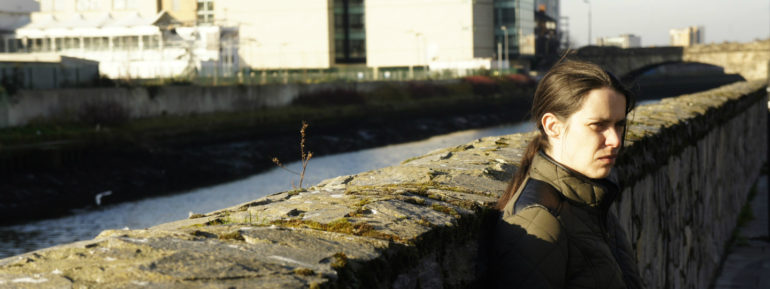Five years ago Irish playwright and scriptwriter Ciaran Creagh wrote a strong , if melancholy, little Irish drama about homelessness, friendship, and the will to survive adversity, called Parked. Featuring the always excellent Colm Meaney the film was well received on its initial release. Now he returns as writer and director for another sombre tale, with In View, a project which had a difficult path to the big screen.
In View is the story of the implosion of Ruth Donnelly a happy married and accomplished Garda detective who, following a drunken indiscretion is revealed loses both her child and her husband in quick succession.A couple of years have passed and Ruth’s life of burdening guilt is dominated by rage, alcoholism, depression and self-loathing, leaving her to eventually conclude that there is only one way for her to reimburse the world.
One look at the poster for In View and you can see its strongest card, as the lead performance from Caoilfhionn Dunne is nothing short of extraordinary. Ruth is a character filled with enormous remorse, regret, self-pity, and self-loathing, and Dunne ensures that the audience can see and feel her pain, but also that they can see and feel, in brief glimpses, the fun, jokey Ruth that existed prior to her tragedy. In View is very much Ruth’s story so the success of the film rests on her shoulders, and Dunne rises to the challenge. When the sombre tone threatens to completely envelop the narrative Dunne, and Creagh’s script, offer moments of humour and levity that allow the audience to relate to Ruth’s emotional journey. These moments of levity are most prevalent with her Garda colleagues, played skilfully by Stuart Graham and Tristan Heanue. Graham is essentially cast in the older brother/protector role, and he brings a gentle, caring persona into play. Likewise Ciarán McMenamin as Denis has a nice soft nature that counterpoints Dunne’s sharpness well. His character has his own guilt and remorse, but unfortunately that is never explored in any measurable way. Other interesting characters that are under-developed are Ruth’s in-laws, played by Gerard McSorley and Maria McDermottroe. They each have an interesting relationship with Ruth following the death of their son and grandson, but in focusing on Ruth so heavily their characters are never more than broad sketches. The best of the minor characters is Joe Mullins’ Magella. Here is a man completely adrift from the world in a haze of his own despair (and with good reason), and Mullins absolutely sells it with just one speech.
In View marks Creagh’s feature directorial debut, and in working from his own script he is on safe ground. Wisely knowing that the film exists entirely in the script and performances he steers away from any directorial flourishes and directs with a relaxed and steady hand. He is ably assisted by cinematographer David Grennan and editor Tony Cranstoun in crafting a film that makes the most of its modest budget, and captures Dublin in a different light than most. There are some wonderful shots of the Phoenix Park and the graveyard scenes are quietly moving, while the colour-grading perfectly matches the tone throughout. Other than Dunne, the strongest element of the film is Creagh’s script. The film unfolds in a measured way, with the story, and the reason for Ruth’s despair, being gradually revealed as the audience moves with her deeper into her depression.
Studies of depression and suicidal thoughts may not be everyone’s cup of tea, but when they are well-written, and superbly performed they can be a worthwhile experience. In View is such a film, and as a result comes highly recommended.

